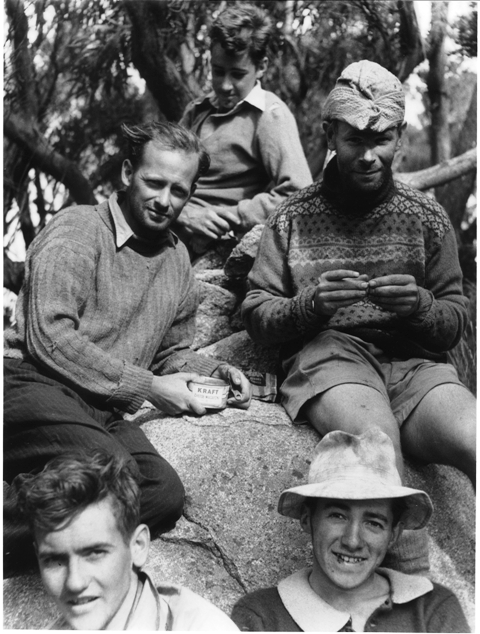BECHERVAISE, John Mayston (1910-1998) Wiki.JPG)
John Bechervaise, circa 1947.
John Bechervaise, teacher, author, poet, explorer, and photographer was a staff member at the Geelong College from 1935-1936 and 1945-1949 and a pioneering leader of the
House of Guilds (HoG). He was educated in Melbourne and England and trained as an artist and print maker.
'Fred' Elliott, a fellow Antarctic adventurer and also a former Geelong College staff member described him as follows:
'John had an insatiable curiosity which fed a keen and inquiring intellect. With his great physical strength, mental stamina and organisational skills, he made full use of his talents and his life was rich in diversity.' In 1934, when in his early twenties, he was appointed by the Principal, Rev F W Rolland, to set up a centre where boys could occupy their spare time. Thus began ‘The House of Guilds’ (HoG), and John's comparatively short but influential career at the College’. He was Warden of the House of Guilds in 1935 and 1936 before he and his wife, Lorna, who also taught at the College Preparatory School, went to England in 1937. There he taught as director of art at St George's School, Harpenden; a co-educational boarding school. While there he qualified to join the Fell and Rockclimbing Club and the Climbers’ Club of Great Britain. A conscientious objector, he later commented that ironically this was more acceptable in England than in Australia.
After the war he returned to Australia and to Lorna who had been stranded here by the war during a visit to her parents in 1939 and, together, they raised four children. In 1945, John resumed his work as Warden of the HoG. He had been so impressed by the Schoolboy Exploration Movement in England that he began a remarkable series of expeditions, initially based on the Ramblers' Guild, but later, from 1947, on the
Geelong College Exploration Society. This was open to the College community as well as students.

Expeditioners on Rodondo Island, circa 1947
John Bechervaise on right.
The Rodondo Island expedition of 1947 attracted worldwide notice and John, always ready to seize the opportunity, used the publicity to persuade the
Sun Newspaper and the Old Collegians to donate two ex-army
'blitz buggies' which extended the scope of expeditions on the mainland. John's last major expedition with the College was the first ascent of Federation Peak in South West Tasmania on the twenty-ninth of January, 1949.
After leaving College in 1949, he became Assistant Editor of
Walkabout Magazine for several years before beginning an association with the Australian Antarctic Division which saw him as Officer in Charge of the 1953 Heard Island Expedition and the 1955 and 1959 Mawson Expeditions’. The 1955/56 expedition was the first to enter Antarctica’s Prince Charles Mountains- Mt Bechervaise (2362 metres) is named after him and Lake Lorna in the Mawson Range honours his wife. Bechervaise Island about 3 kilometres from Mawson Base on Heard Island was also named in his honour. In 1956 he was awarded the Polar Medal.
His great-great-grandfather, also John Bechervaise, had been an arctic explorer and had clearly inspired his namesake. This early John Bechervaise had taken part in the heroic but disastrous expedition led by Sir John Franklin to find the long sought North-West Passage and had taken the ship Blossom into the Bering Sea to await him. He had been awarded the Arctic Medal for his efforts.
John returned to teaching in 1962, this time at Geelong Grammar School as Director of Studies. He remained there until 1972. Then followed years of travel - guiding tours in Tibet and China, and writing. Just before his final illness, his biography of Sir John Rymill was published in England. In a prolific writing career, John published 28 books and contributed to a wide number of magazines as well as extensive lecturing and radio broadcasting. His personal papers are held at the National Archives, Canberra. The College Archives holds an extensive collection of negatives mainly of the School taken by John Bechervaise in the mid 1930s. These were rescued and donated to the College by Fred Elliott.
'How hard it is to write when all is over and a thousand thoughts without regard to time and place rush into consciousness. One stands in memory beside the deep cold waters of Tarli Karng, gazes dreamily into the vast log fires of lonely cattlemen’s huts, feels the whistle of cool air on the long downhill ski run – all in an instant. Diaries and log-books give cold consecutive facts, volumes would be required to write of all the passing interests and beauty of a single day spent beyond the ends of roads.' - John Bechervaise, October 1936.
Sources: Fred Elliott - Ad Astra No 90 August 1998; Brian Walters; John Mayston Bechervaise Wild Winter, 2001 p32-35;